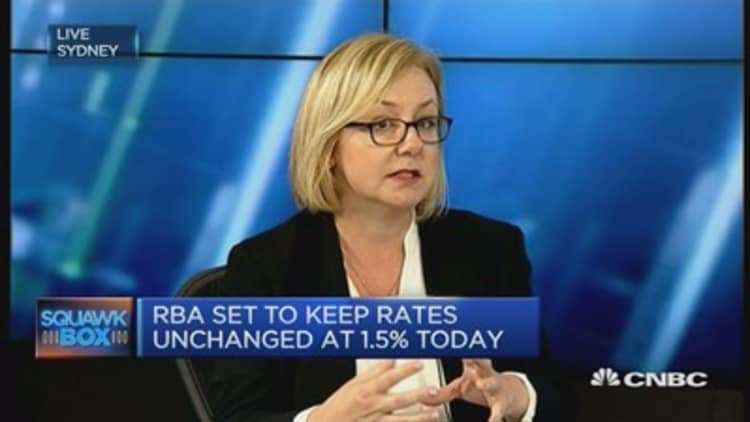Australia's trade surplus came in much higher than expected in February, but that's likely a signal of economic weakness, not strength.
The trade surplus Down Under surged to 3.57 billion Australian dollars ($2.72 billion) in February, in seasonally adjusted terms, according to data released on Tuesday, well above the around A$1.8 billion forecast in a Reuters poll.
That surge appeared to be less due to exports, which rose 1 percent on-month, to A$32.4 billion in seasonally adjusted terms, and more due to imports, which dropped 5 percent on-month to A$28.83 billion, seasonally adjusted.
The data spurred the Australian dollar up to as high as $0.7614, up from levels as low as $0.7585 before the data.
Analysts weren't optimistic about what the trade surplus signalled for the economy.
"It's sort of good news, but it is a bit mixed," Felicity Emmett, senior economist at ANZ, told CNBC's "Squawk Box" on Tuesday. "Weakness in imports could actually suggest that there's some softening in momentum on domestic demand. So on the one hand, that's a bit concerning, but obviously the strength in exports is very positive. "

She noted that the export strength was due in part to the recent rise in commodity prices and an expansion in the volumes of iron ore shipments, which could see the country post a current account surplus as well.
Emmett noted that the data highlight the difficult decision faced by the Reserve Bank of Australia (RBA), which was due to announce the results of its monetary policy meeting later in the day.
"On the one hand, they've got very strong gains in house prices and we're seeing that flow through to construction. We saw yesterday's building approvals numbers surprise on the high side," she said. "But when you look at nearly all the other indicators outside of housing, they've actually been quite weak, especially around the household. And the RBA is really worried about weak wages growth."
To be sure, not everyone attributed much significance to the trade data.
Paul Dales, chief Australia economist at Capital Economics, said the rebound in the trade surplus could be laid at the door of Lunar New Year distortions, which reduced the surplus in January.
"Because the holiday was earlier than usual this year, more of the rush in China to fulfil export orders happened in January, which boosted Chinese exports and therefore Australia's imports. In February, the reverse happened," he said in a note Tuesday.
"With commodity prices having started to edge lower and Cyclone Debbie currently reducing the volume of coal exports, the trade surplus may have peaked."
—By CNBC.Com's Leslie Shaffer; Follow her on Twitter @LeslieShaffer1


